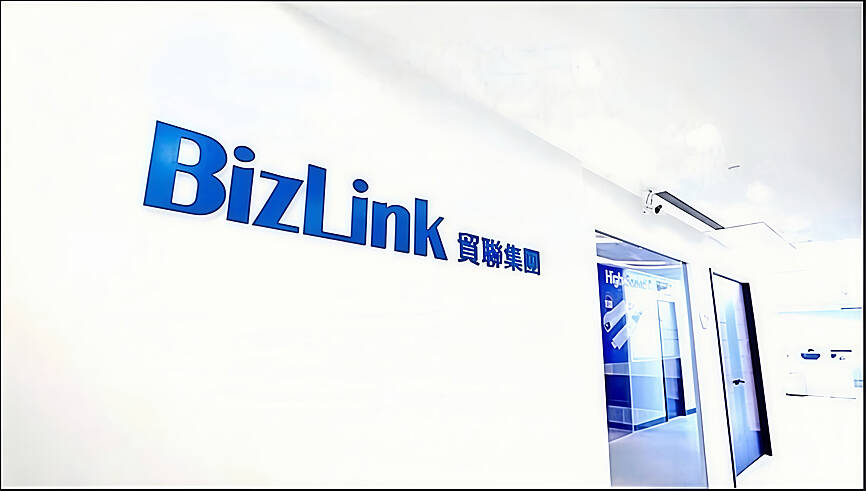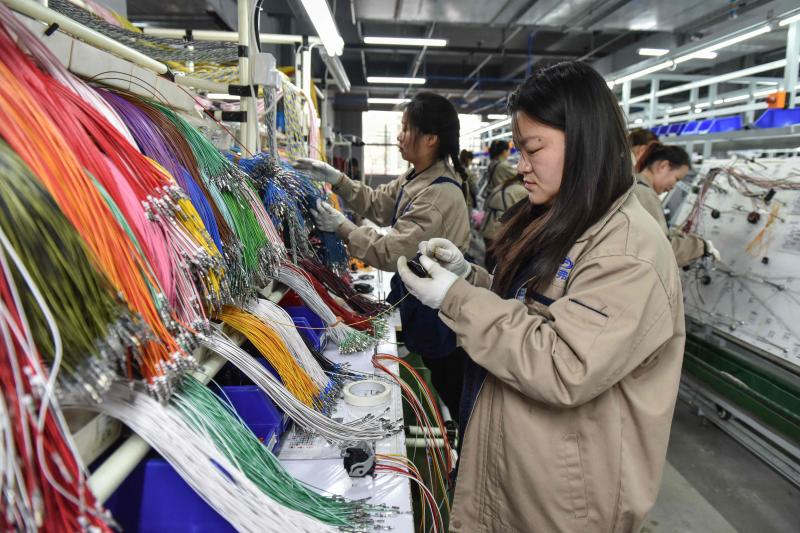Wire harness maker BizLink Holding Inc (貿聯控股) on Tuesday said it is to acquire a 100 percent stake in Alpha Elektrotechnik AG in Switzerland to offer high-voltage cable solutions.
The deal, valued at 24.3 million Swiss francs (US$27.49 million), would be financed through an all-cash transaction and is expected to be completed in the second quarter, the company said.
Alpha, a rolling stock unit spun off from rotary transfer machine maker Pfiffner Group, offers high-voltage cable solutions for high-speed trains, intercity trains, local trains and locomotives, BizLink said.

Photo courtesy of BizLink Holding Inc
In its latest fiscal year, Alpha recorded sales of 11.1 million Swiss francs, it said.
“We will leverage our collaborations with Alpha to realize synergies in technology and new application development, as well as in market access development,” BizLink chief financial officer Charles Tsai (蔡策申) said. “This deal is expected to be accretive from day one.”
“The attractiveness of the rolling stock interconnect market is underscored by its robust growth prospects, technological innovation and strategic consolidation, with only a few known and reliable solutions providers, including BizLink,” Tsai said. “We ... look forward to their contributions.”

Photo: AFP
BizLink supplies wiring harnesses and other interconnect solutions for global brands.
The Alpha deal comes after the company last year acquired Slovakian electrical equipment maker Easys s.r.o. for 51.5 million euros (US$56.04 million) to bolster its semiconductor equipment business and extend its reach in eastern Europe.
BizLink said its capital expenditures this year are expected to be higher than the US$80 million to US$100 million it spent in past years as the company prepares for growth.
Most of the money would be spent on equipment, especially for high-performance computing and semiconductor equipment, the company said.
It would also update information technology systems to accelerate its digital transformation efforts, the company added.
In addition, BizLink said it would continue to rationalize the company’s footprint in China’s Changzhou and Xiamen, as well as pursue strategic expansion elsewhere, including in Southeast Asia.
BizLink on Tuesday also released its financial results for the fourth quarter of last year and for the whole of the year.
During the October-to-December quarter, the company’s net profit was NT$1.56 billion (US$47.4 million), up 206 percent year-on-year and hitting the highest level for a single quarter, with earnings per share of NT$8.28. Revenue in the quarter rose 18 percent to NT$14.41 billion from a year earlier.
For the full year, the company reported total net profit of NT$4.4 billion, up 89.7 percent from the previous year, with earnings per share of NT$25.41, also the highest on record. Revenue rose 5.93 percent to NT$54.08 billion.
Last year, gross margin improved by 3.55 percentage points to 28.2 percent, the highest in eight years, while operating margin increased by 3.84 percentage points to 12.1 percent, a record high, company data showed.

Jensen Huang (黃仁勳), founder and CEO of US-based artificial intelligence chip designer Nvidia Corp and Taiwan Semiconductor Manufacturing Co (TSMC, 台積電) on Friday celebrated the first Nvidia Blackwell wafer produced on US soil. Huang visited TSMC’s advanced wafer fab in the US state of Arizona and joined the Taiwanese chipmaker’s executives to witness the efforts to “build the infrastructure that powers the world’s AI factories, right here in America,” Nvidia said in a statement. At the event, Huang joined Y.L. Wang (王英郎), vice president of operations at TSMC, in signing their names on the Blackwell wafer to

France cannot afford to ignore the third credit-rating reduction in less than a year, French Minister of Finance Roland Lescure said. “Three agencies have downgraded us and we can’t ignore this cloud,” he told Franceinfo on Saturday, speaking just hours after S&P lowered his country’s credit rating to “A+” from “AA-” in an unscheduled move. “Fundamentally, it’s an additional cloud to a weather forecast that was already pretty gray. It’s a call for lucidity and responsibility,” he said, adding that this is “a call to be serious.” The credit assessor’s move means France has lost its double-A rating at two of the

AI BOOST: Although Taiwan’s reliance on Chinese rare earth elements is limited, it could face indirect impacts from supply issues and price volatility, an economist said DBS Bank Ltd (星展銀行) has sharply raised its forecast for Taiwan’s economic growth this year to 5.6 percent, citing stronger-than-expected exports and investment linked to artificial intelligence (AI), as it said that the current momentum could peak soon. The acceleration of the global AI race has fueled a surge in Taiwan’s AI-related capital spending and exports of information and communications technology (ICT) products, which have been key drivers of growth this year. “We have revised our GDP forecast for Taiwan upward to 5.6 percent from 4 percent, an upgrade that mainly reflects stronger-than-expected AI-related exports and investment in the third

RARE EARTHS: The call between the US Treasury Secretary and his Chinese counterpart came as Washington sought to rally G7 partners in response to China’s export controls China and the US on Saturday agreed to conduct another round of trade negotiations in the coming week, as the world’s two biggest economies seek to avoid another damaging tit-for-tat tariff battle. Beijing last week announced sweeping controls on the critical rare earths industry, prompting US President Donald Trump to threaten 100 percent tariffs on imports from China in retaliation. Trump had also threatened to cancel his expected meeting with Chinese President Xi Jinping (習近平) in South Korea later this month on the sidelines of the APEC summit. In the latest indication of efforts to resolve their dispute, Chinese state media reported that